Bribery Laws in International Business Transactions: A Legal Report
VerifiedAdded on 2021/06/14
|6
|1394
|111
Report
AI Summary
This report provides a legal analysis of international business transactions, specifically focusing on the application of Australian bribery legislation. It examines a factual scenario involving a building contract for an international airport, exploring potential violations of the Criminal Code Act 1995, which implements Australia's obligations under the OECD and UNCAC conventions. The analysis covers various aspects of bribery, including payments to foreign officials, facilitation payments, and the implications of providing benefits to government representatives. The report considers the extraterritorial jurisdiction of the Act and its application to different scenarios, such as payments to the Minister's cousin, luxurious trips for airport corporation members, and the employment of directors in a subsidiary. It concludes by assessing whether the actions described constitute bribery offenses under Australian law, referencing relevant sections of the Criminal Code Act and providing a comprehensive understanding of the legal framework governing international business transactions.
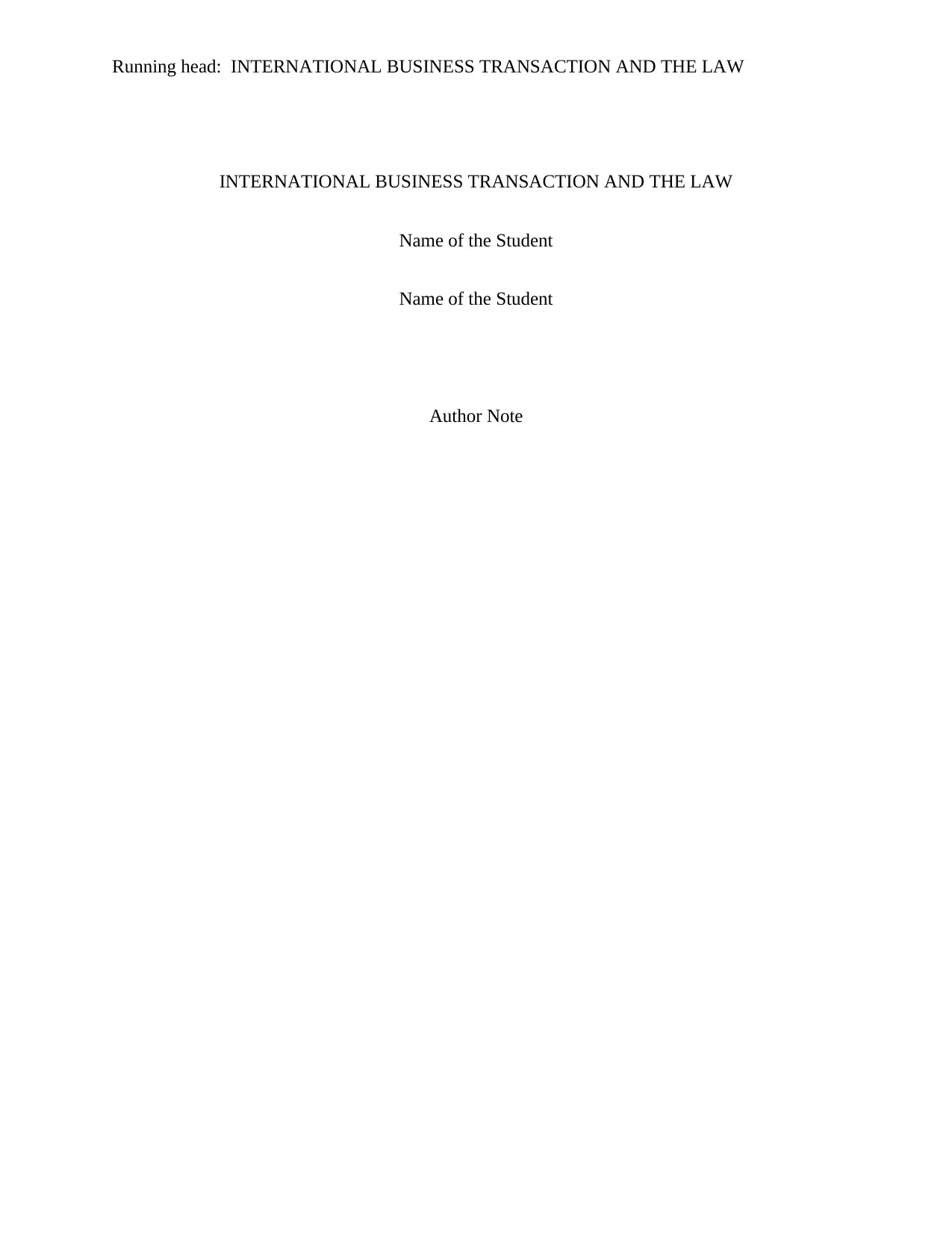
Running head: INTERNATIONAL BUSINESS TRANSACTION AND THE LAW
INTERNATIONAL BUSINESS TRANSACTION AND THE LAW
Name of the Student
Name of the Student
Author Note
INTERNATIONAL BUSINESS TRANSACTION AND THE LAW
Name of the Student
Name of the Student
Author Note
Paraphrase This Document
Need a fresh take? Get an instant paraphrase of this document with our AI Paraphraser
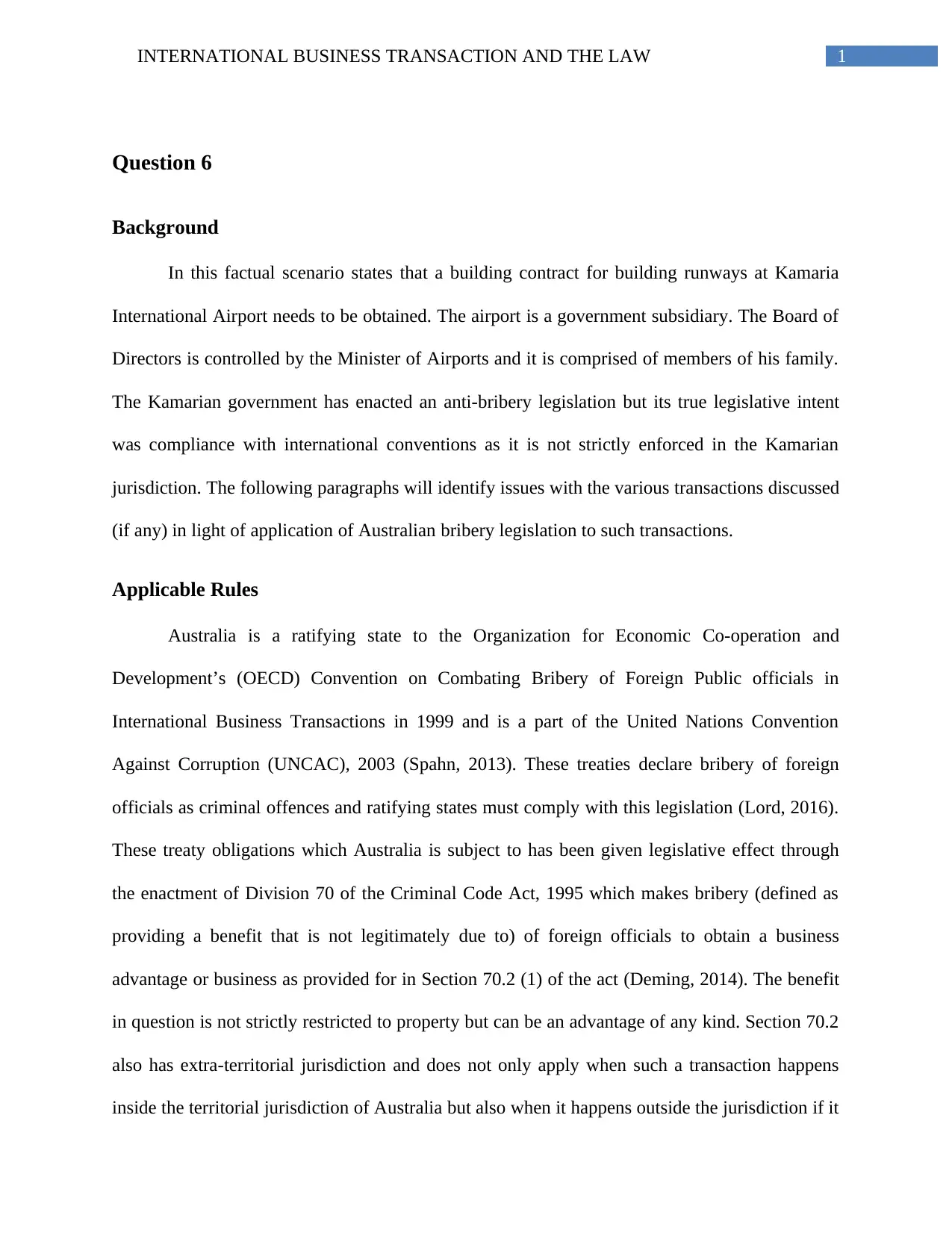
1INTERNATIONAL BUSINESS TRANSACTION AND THE LAW
Question 6
Background
In this factual scenario states that a building contract for building runways at Kamaria
International Airport needs to be obtained. The airport is a government subsidiary. The Board of
Directors is controlled by the Minister of Airports and it is comprised of members of his family.
The Kamarian government has enacted an anti-bribery legislation but its true legislative intent
was compliance with international conventions as it is not strictly enforced in the Kamarian
jurisdiction. The following paragraphs will identify issues with the various transactions discussed
(if any) in light of application of Australian bribery legislation to such transactions.
Applicable Rules
Australia is a ratifying state to the Organization for Economic Co-operation and
Development’s (OECD) Convention on Combating Bribery of Foreign Public officials in
International Business Transactions in 1999 and is a part of the United Nations Convention
Against Corruption (UNCAC), 2003 (Spahn, 2013). These treaties declare bribery of foreign
officials as criminal offences and ratifying states must comply with this legislation (Lord, 2016).
These treaty obligations which Australia is subject to has been given legislative effect through
the enactment of Division 70 of the Criminal Code Act, 1995 which makes bribery (defined as
providing a benefit that is not legitimately due to) of foreign officials to obtain a business
advantage or business as provided for in Section 70.2 (1) of the act (Deming, 2014). The benefit
in question is not strictly restricted to property but can be an advantage of any kind. Section 70.2
also has extra-territorial jurisdiction and does not only apply when such a transaction happens
inside the territorial jurisdiction of Australia but also when it happens outside the jurisdiction if it
Question 6
Background
In this factual scenario states that a building contract for building runways at Kamaria
International Airport needs to be obtained. The airport is a government subsidiary. The Board of
Directors is controlled by the Minister of Airports and it is comprised of members of his family.
The Kamarian government has enacted an anti-bribery legislation but its true legislative intent
was compliance with international conventions as it is not strictly enforced in the Kamarian
jurisdiction. The following paragraphs will identify issues with the various transactions discussed
(if any) in light of application of Australian bribery legislation to such transactions.
Applicable Rules
Australia is a ratifying state to the Organization for Economic Co-operation and
Development’s (OECD) Convention on Combating Bribery of Foreign Public officials in
International Business Transactions in 1999 and is a part of the United Nations Convention
Against Corruption (UNCAC), 2003 (Spahn, 2013). These treaties declare bribery of foreign
officials as criminal offences and ratifying states must comply with this legislation (Lord, 2016).
These treaty obligations which Australia is subject to has been given legislative effect through
the enactment of Division 70 of the Criminal Code Act, 1995 which makes bribery (defined as
providing a benefit that is not legitimately due to) of foreign officials to obtain a business
advantage or business as provided for in Section 70.2 (1) of the act (Deming, 2014). The benefit
in question is not strictly restricted to property but can be an advantage of any kind. Section 70.2
also has extra-territorial jurisdiction and does not only apply when such a transaction happens
inside the territorial jurisdiction of Australia but also when it happens outside the jurisdiction if it
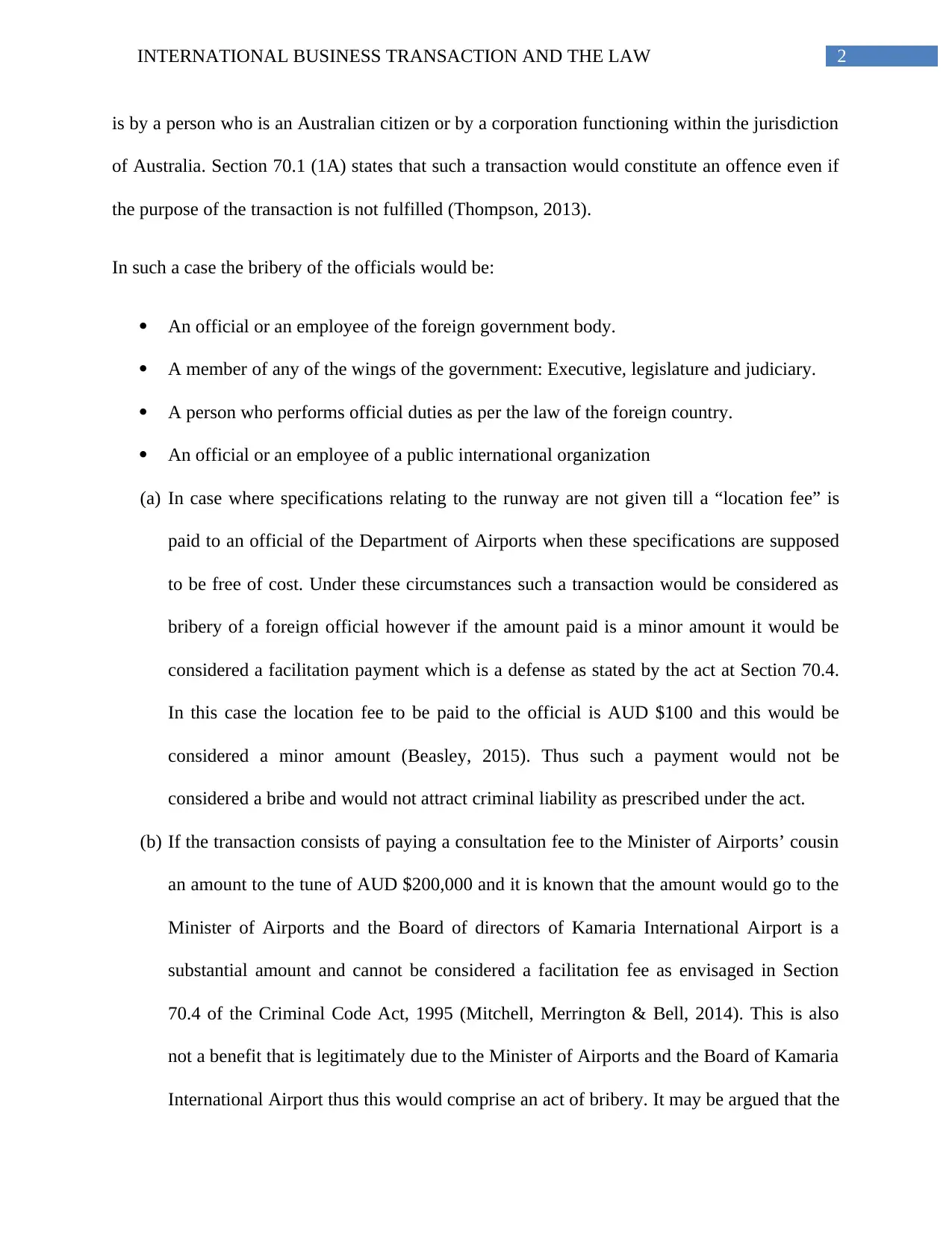
2INTERNATIONAL BUSINESS TRANSACTION AND THE LAW
is by a person who is an Australian citizen or by a corporation functioning within the jurisdiction
of Australia. Section 70.1 (1A) states that such a transaction would constitute an offence even if
the purpose of the transaction is not fulfilled (Thompson, 2013).
In such a case the bribery of the officials would be:
An official or an employee of the foreign government body.
A member of any of the wings of the government: Executive, legislature and judiciary.
A person who performs official duties as per the law of the foreign country.
An official or an employee of a public international organization
(a) In case where specifications relating to the runway are not given till a “location fee” is
paid to an official of the Department of Airports when these specifications are supposed
to be free of cost. Under these circumstances such a transaction would be considered as
bribery of a foreign official however if the amount paid is a minor amount it would be
considered a facilitation payment which is a defense as stated by the act at Section 70.4.
In this case the location fee to be paid to the official is AUD $100 and this would be
considered a minor amount (Beasley, 2015). Thus such a payment would not be
considered a bribe and would not attract criminal liability as prescribed under the act.
(b) If the transaction consists of paying a consultation fee to the Minister of Airports’ cousin
an amount to the tune of AUD $200,000 and it is known that the amount would go to the
Minister of Airports and the Board of directors of Kamaria International Airport is a
substantial amount and cannot be considered a facilitation fee as envisaged in Section
70.4 of the Criminal Code Act, 1995 (Mitchell, Merrington & Bell, 2014). This is also
not a benefit that is legitimately due to the Minister of Airports and the Board of Kamaria
International Airport thus this would comprise an act of bribery. It may be argued that the
is by a person who is an Australian citizen or by a corporation functioning within the jurisdiction
of Australia. Section 70.1 (1A) states that such a transaction would constitute an offence even if
the purpose of the transaction is not fulfilled (Thompson, 2013).
In such a case the bribery of the officials would be:
An official or an employee of the foreign government body.
A member of any of the wings of the government: Executive, legislature and judiciary.
A person who performs official duties as per the law of the foreign country.
An official or an employee of a public international organization
(a) In case where specifications relating to the runway are not given till a “location fee” is
paid to an official of the Department of Airports when these specifications are supposed
to be free of cost. Under these circumstances such a transaction would be considered as
bribery of a foreign official however if the amount paid is a minor amount it would be
considered a facilitation payment which is a defense as stated by the act at Section 70.4.
In this case the location fee to be paid to the official is AUD $100 and this would be
considered a minor amount (Beasley, 2015). Thus such a payment would not be
considered a bribe and would not attract criminal liability as prescribed under the act.
(b) If the transaction consists of paying a consultation fee to the Minister of Airports’ cousin
an amount to the tune of AUD $200,000 and it is known that the amount would go to the
Minister of Airports and the Board of directors of Kamaria International Airport is a
substantial amount and cannot be considered a facilitation fee as envisaged in Section
70.4 of the Criminal Code Act, 1995 (Mitchell, Merrington & Bell, 2014). This is also
not a benefit that is legitimately due to the Minister of Airports and the Board of Kamaria
International Airport thus this would comprise an act of bribery. It may be argued that the
⊘ This is a preview!⊘
Do you want full access?
Subscribe today to unlock all pages.

Trusted by 1+ million students worldwide
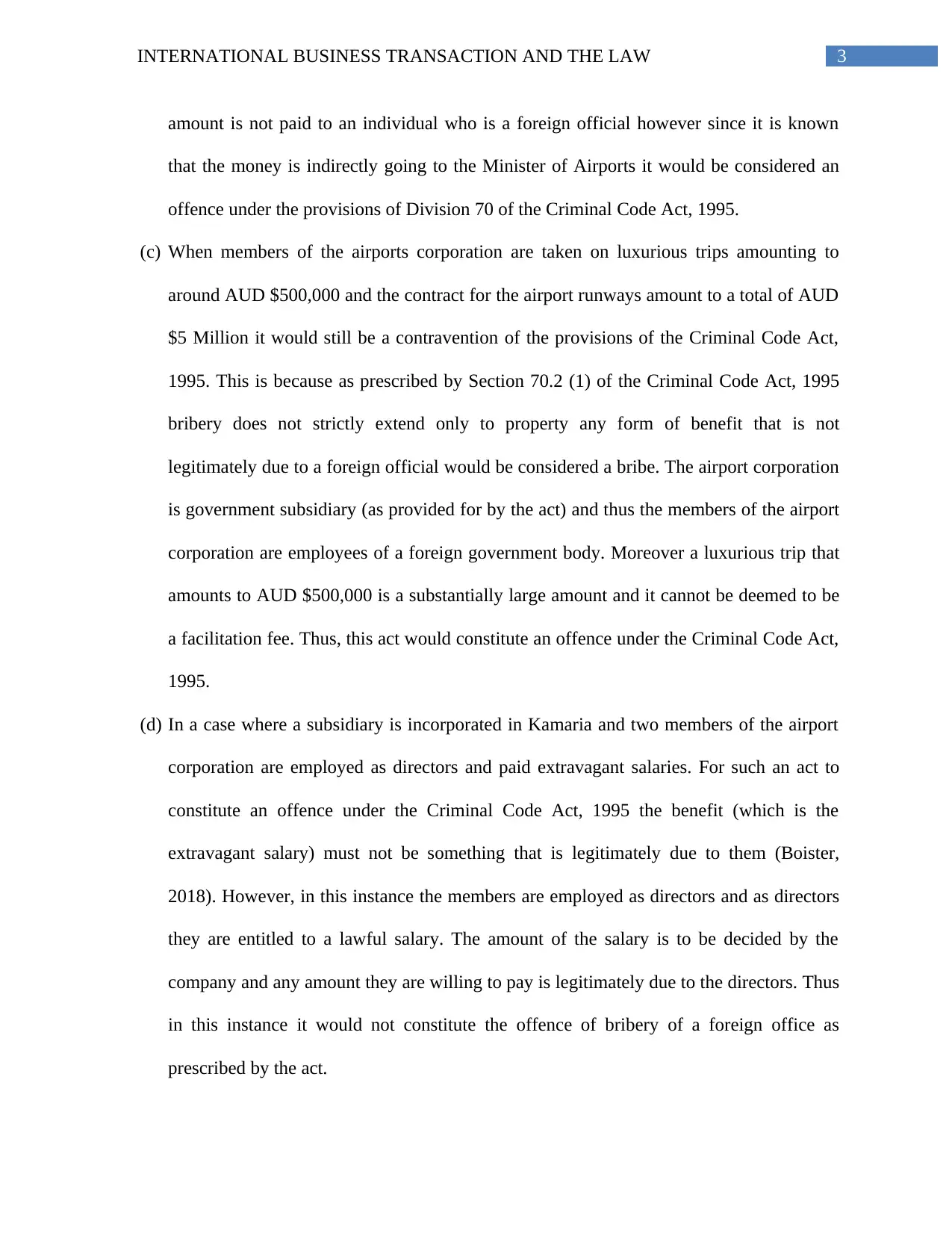
3INTERNATIONAL BUSINESS TRANSACTION AND THE LAW
amount is not paid to an individual who is a foreign official however since it is known
that the money is indirectly going to the Minister of Airports it would be considered an
offence under the provisions of Division 70 of the Criminal Code Act, 1995.
(c) When members of the airports corporation are taken on luxurious trips amounting to
around AUD $500,000 and the contract for the airport runways amount to a total of AUD
$5 Million it would still be a contravention of the provisions of the Criminal Code Act,
1995. This is because as prescribed by Section 70.2 (1) of the Criminal Code Act, 1995
bribery does not strictly extend only to property any form of benefit that is not
legitimately due to a foreign official would be considered a bribe. The airport corporation
is government subsidiary (as provided for by the act) and thus the members of the airport
corporation are employees of a foreign government body. Moreover a luxurious trip that
amounts to AUD $500,000 is a substantially large amount and it cannot be deemed to be
a facilitation fee. Thus, this act would constitute an offence under the Criminal Code Act,
1995.
(d) In a case where a subsidiary is incorporated in Kamaria and two members of the airport
corporation are employed as directors and paid extravagant salaries. For such an act to
constitute an offence under the Criminal Code Act, 1995 the benefit (which is the
extravagant salary) must not be something that is legitimately due to them (Boister,
2018). However, in this instance the members are employed as directors and as directors
they are entitled to a lawful salary. The amount of the salary is to be decided by the
company and any amount they are willing to pay is legitimately due to the directors. Thus
in this instance it would not constitute the offence of bribery of a foreign office as
prescribed by the act.
amount is not paid to an individual who is a foreign official however since it is known
that the money is indirectly going to the Minister of Airports it would be considered an
offence under the provisions of Division 70 of the Criminal Code Act, 1995.
(c) When members of the airports corporation are taken on luxurious trips amounting to
around AUD $500,000 and the contract for the airport runways amount to a total of AUD
$5 Million it would still be a contravention of the provisions of the Criminal Code Act,
1995. This is because as prescribed by Section 70.2 (1) of the Criminal Code Act, 1995
bribery does not strictly extend only to property any form of benefit that is not
legitimately due to a foreign official would be considered a bribe. The airport corporation
is government subsidiary (as provided for by the act) and thus the members of the airport
corporation are employees of a foreign government body. Moreover a luxurious trip that
amounts to AUD $500,000 is a substantially large amount and it cannot be deemed to be
a facilitation fee. Thus, this act would constitute an offence under the Criminal Code Act,
1995.
(d) In a case where a subsidiary is incorporated in Kamaria and two members of the airport
corporation are employed as directors and paid extravagant salaries. For such an act to
constitute an offence under the Criminal Code Act, 1995 the benefit (which is the
extravagant salary) must not be something that is legitimately due to them (Boister,
2018). However, in this instance the members are employed as directors and as directors
they are entitled to a lawful salary. The amount of the salary is to be decided by the
company and any amount they are willing to pay is legitimately due to the directors. Thus
in this instance it would not constitute the offence of bribery of a foreign office as
prescribed by the act.
Paraphrase This Document
Need a fresh take? Get an instant paraphrase of this document with our AI Paraphraser
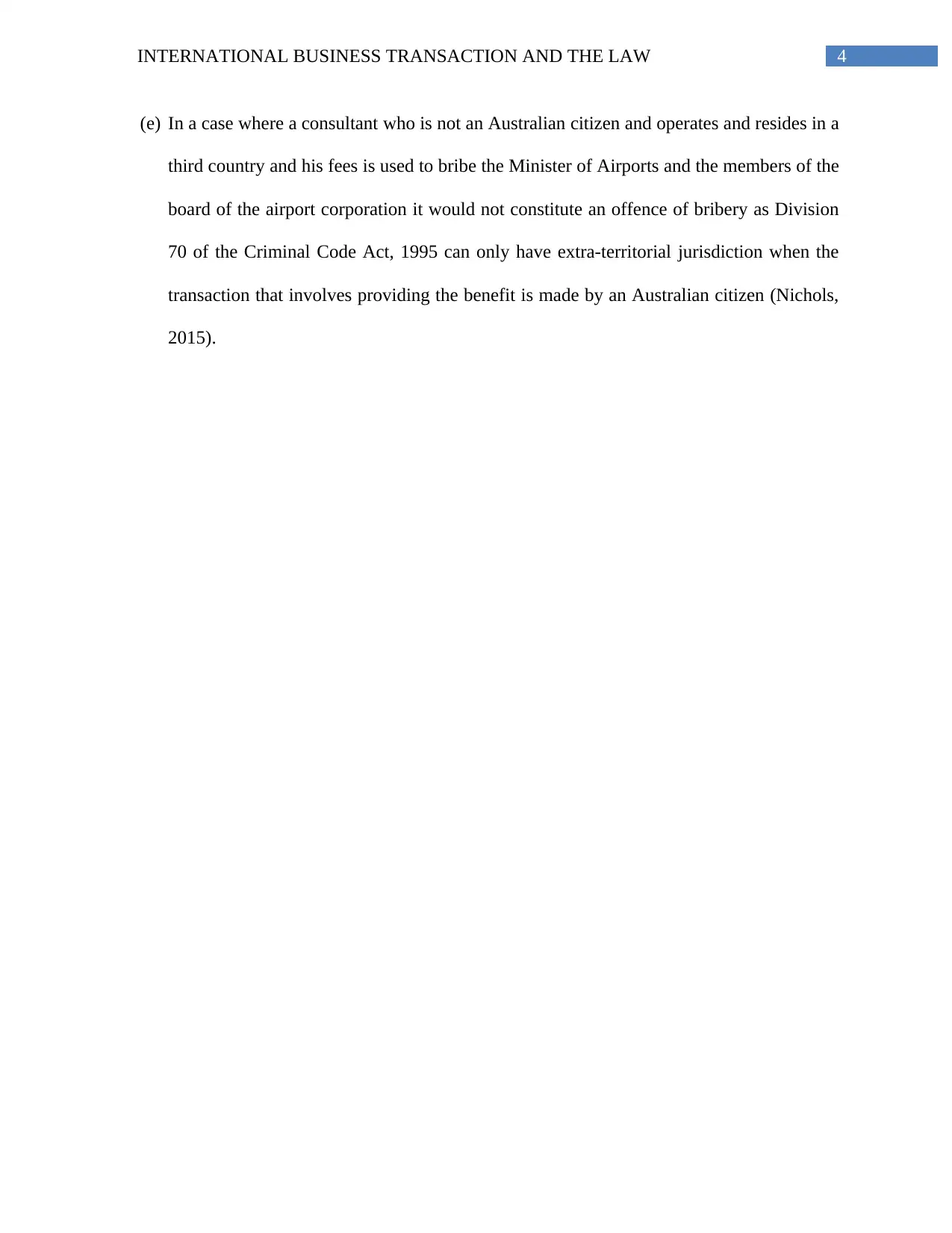
4INTERNATIONAL BUSINESS TRANSACTION AND THE LAW
(e) In a case where a consultant who is not an Australian citizen and operates and resides in a
third country and his fees is used to bribe the Minister of Airports and the members of the
board of the airport corporation it would not constitute an offence of bribery as Division
70 of the Criminal Code Act, 1995 can only have extra-territorial jurisdiction when the
transaction that involves providing the benefit is made by an Australian citizen (Nichols,
2015).
(e) In a case where a consultant who is not an Australian citizen and operates and resides in a
third country and his fees is used to bribe the Minister of Airports and the members of the
board of the airport corporation it would not constitute an offence of bribery as Division
70 of the Criminal Code Act, 1995 can only have extra-territorial jurisdiction when the
transaction that involves providing the benefit is made by an Australian citizen (Nichols,
2015).
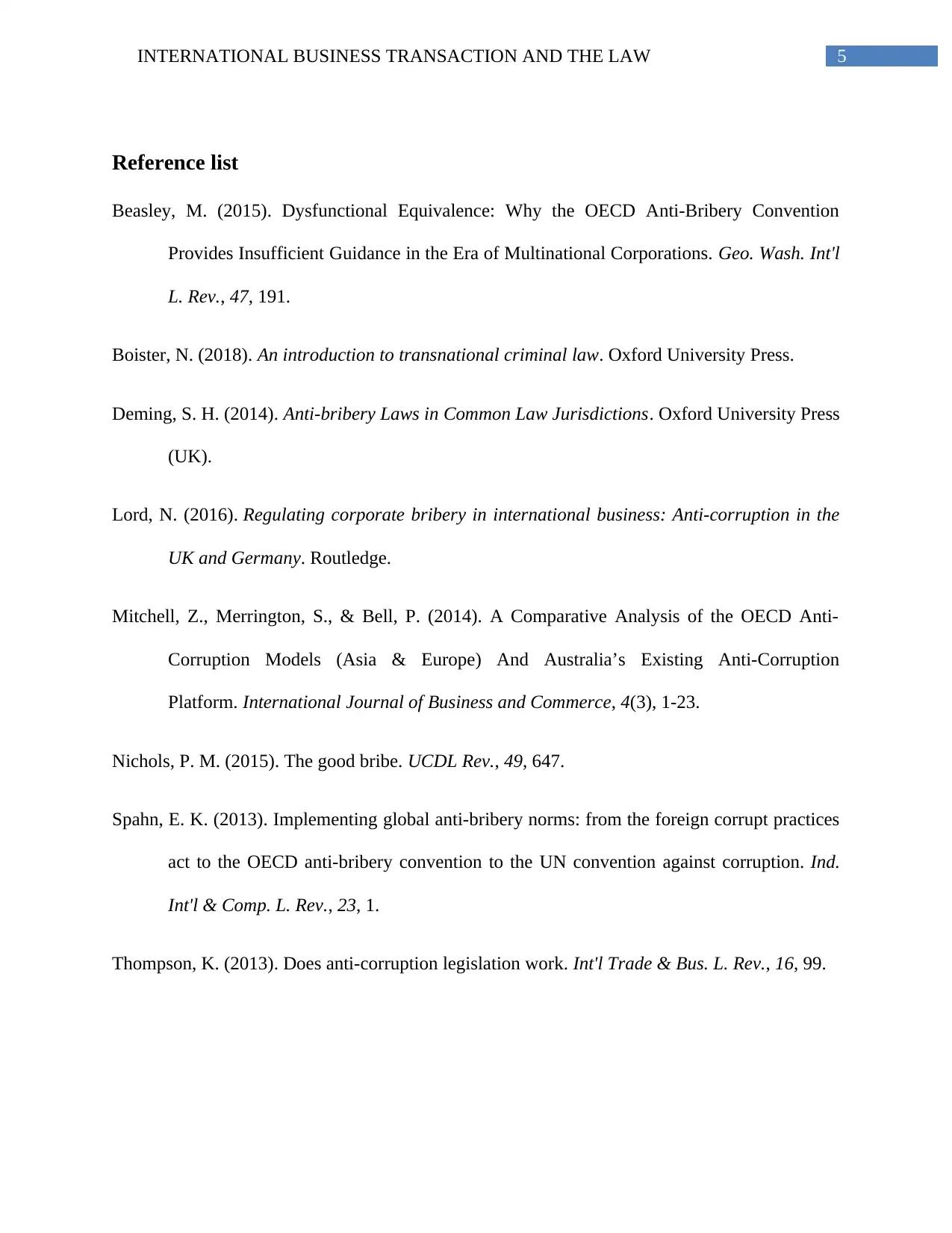
5INTERNATIONAL BUSINESS TRANSACTION AND THE LAW
Reference list
Beasley, M. (2015). Dysfunctional Equivalence: Why the OECD Anti-Bribery Convention
Provides Insufficient Guidance in the Era of Multinational Corporations. Geo. Wash. Int'l
L. Rev., 47, 191.
Boister, N. (2018). An introduction to transnational criminal law. Oxford University Press.
Deming, S. H. (2014). Anti-bribery Laws in Common Law Jurisdictions. Oxford University Press
(UK).
Lord, N. (2016). Regulating corporate bribery in international business: Anti-corruption in the
UK and Germany. Routledge.
Mitchell, Z., Merrington, S., & Bell, P. (2014). A Comparative Analysis of the OECD Anti-
Corruption Models (Asia & Europe) And Australia’s Existing Anti-Corruption
Platform. International Journal of Business and Commerce, 4(3), 1-23.
Nichols, P. M. (2015). The good bribe. UCDL Rev., 49, 647.
Spahn, E. K. (2013). Implementing global anti-bribery norms: from the foreign corrupt practices
act to the OECD anti-bribery convention to the UN convention against corruption. Ind.
Int'l & Comp. L. Rev., 23, 1.
Thompson, K. (2013). Does anti-corruption legislation work. Int'l Trade & Bus. L. Rev., 16, 99.
Reference list
Beasley, M. (2015). Dysfunctional Equivalence: Why the OECD Anti-Bribery Convention
Provides Insufficient Guidance in the Era of Multinational Corporations. Geo. Wash. Int'l
L. Rev., 47, 191.
Boister, N. (2018). An introduction to transnational criminal law. Oxford University Press.
Deming, S. H. (2014). Anti-bribery Laws in Common Law Jurisdictions. Oxford University Press
(UK).
Lord, N. (2016). Regulating corporate bribery in international business: Anti-corruption in the
UK and Germany. Routledge.
Mitchell, Z., Merrington, S., & Bell, P. (2014). A Comparative Analysis of the OECD Anti-
Corruption Models (Asia & Europe) And Australia’s Existing Anti-Corruption
Platform. International Journal of Business and Commerce, 4(3), 1-23.
Nichols, P. M. (2015). The good bribe. UCDL Rev., 49, 647.
Spahn, E. K. (2013). Implementing global anti-bribery norms: from the foreign corrupt practices
act to the OECD anti-bribery convention to the UN convention against corruption. Ind.
Int'l & Comp. L. Rev., 23, 1.
Thompson, K. (2013). Does anti-corruption legislation work. Int'l Trade & Bus. L. Rev., 16, 99.
⊘ This is a preview!⊘
Do you want full access?
Subscribe today to unlock all pages.

Trusted by 1+ million students worldwide
1 out of 6
Related Documents
Your All-in-One AI-Powered Toolkit for Academic Success.
+13062052269
info@desklib.com
Available 24*7 on WhatsApp / Email
![[object Object]](/_next/static/media/star-bottom.7253800d.svg)
Unlock your academic potential
Copyright © 2020–2025 A2Z Services. All Rights Reserved. Developed and managed by ZUCOL.




